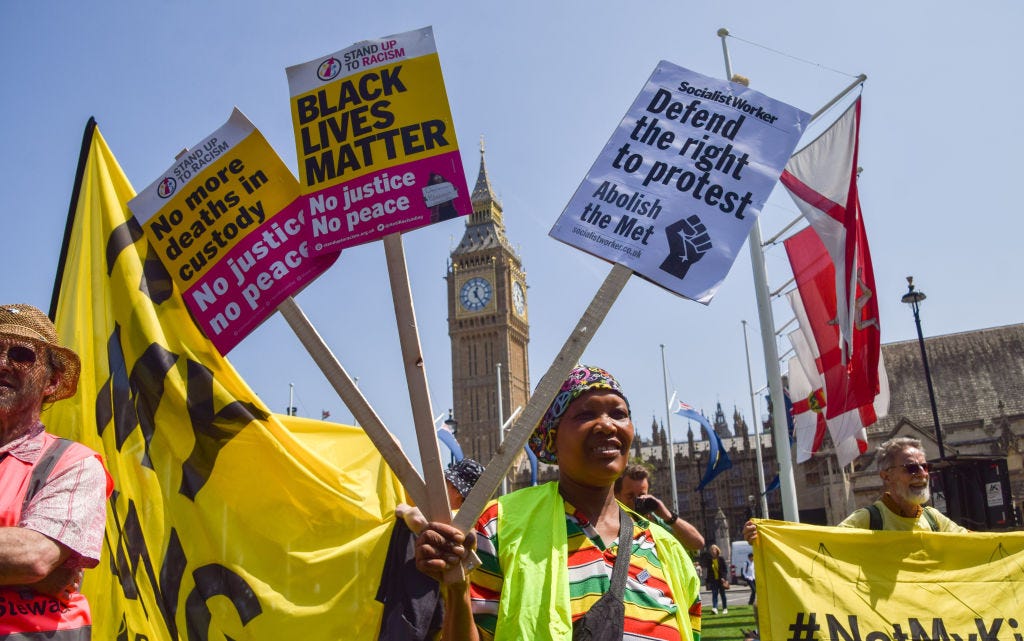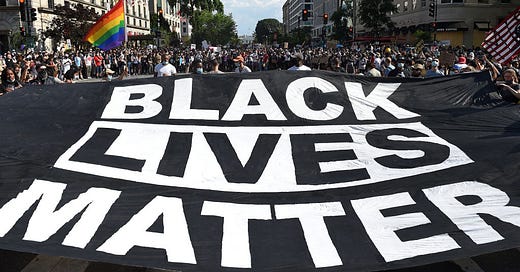
On this day in 1865, two and a half years after the Emancipation Proclamation went into effect, the enslaved people of Galveston, Texas—there were more than 250,000 of them—heard the news that they were free. President Biden, 156 years later, made June 19 a federal holiday to officially commemorate what has been rightly called America’s Second Independence Day.
Growing up, I am embarrassed to admit I did not know about Juneteenth. It was only over the past decade, perhaps like many of you, that I came to understand its significance. The meaning of the day was deepened for me by my friend Thomas Chatterton Williams, for whom Juneteenth has always been a deeply personal holiday. Thomas’s father was raised in Galveston, Texas, under Jim Crow. Thomas’s grandfather was born in 1865—the year those Union soldiers arrived in Texas to tell them slavery had ended.
I think about Thomas’s family story on this day—and also when I think about the possibility of progress in America. And yet so much of the conversation about race in this country feels unmoored from the idea that change is possible. It feels fraught at best and deeply pessimistic—almost nihilistic—at worst.
It doesn’t have to be that way, argues Tomiwa Owolade, a British writer born in Nigeria. He believes that America’s ideas about race are our worst export—and that if we want a better blueprint for this hard conversation we would do well to look to other countries and cultures that celebrate the multiplicity of black identities.
Tomiwa’s new book, out Thursday in the UK, is called “This Is Not America: Why Black Lives in Britain Matter.” On Tuesday, June 27, we’re hosting him for a Free Press Behind the Scenes to talk more about how we need to talk about race.
This event is available to paid subscribers only, so if you want to be part of the conversation, save the date and become a paid subscriber today.
—BW
At some point following George Floyd’s tragic death and America’s racial reckoning, the London Review of Books and the Times Literary Supplement changed the capitalization of the word black to Black. I can’t remember when exactly. It doesn’t matter. But, like the student itching to ask the awkward question, I couldn’t let it go. Why did both British publications, which I grew up on and still love, insist on adopting this very American convention?
To my mind, black should be spelled with a lowercase b because it’s a racial identity—not an ethnic one. I fear that capitalizing it draws attention to race, or even prioritizes it. I want individuals to think of themselves and to be thought of as individuals.
Still, as a British writer with a keen interest in American culture and history, I (sort of) get why Americans feel the need to cap up “Black.”
“Black with a capital ‘B,’ ” the writer Lori Tharps explained, “refers to a group of people whose ancestors were born in Africa, were brought to the United States against their will, spilled their blood, sweat and tears to build this nation into a world power and along the way managed to create glorious works of art, passionate music, scientific discoveries, a marvelous cuisine, and untold literary masterpieces.”
Of course Tharps is thinking inside the framework of American history. (She is from Milwaukee.) But that’s why her theories of culture and politics shouldn’t be imposed upon—or embraced by—the rest of the world.
Unfortunately, this is exactly what has happened over the past three years in the wake of the Black Lives Matter movement. Recall the explosion in protests across the globe, not only in Britain but in France, Australia, South Africa, Mexico, Colombia, Indonesia, and elsewhere. (In Indonesia, #AllPapuanLivesMatter went viral amid tensions between the Papuan—the black and Christian minority—and the Muslim majority.) Nor is it just protests. It’s the mimicking—the appropriation—of American language and ideas, the mass promulgation of a way of thinking that has, on balance, been bad for America. And bad, by extension, for the rest of the world.
Right now, we have things upside down. Instead of America importing its ideas about how to think and talk about race to other countries, other countries should be exporting their ideas to America—which, let’s be honest, does an abominable job of thinking and talking about race.
If we all desire a better conversation about this most sensitive of immutable traits, it should not be made in the U.S.A.

When I was a little boy living with my family in Nigeria in the early aughts, I watched the television series Roots. I was eight years old and felt an intense connection with the slaves in the show. We shared the same racial identity. We came from the same continent.
In retrospect, it was an odd reaction. None of my ancestors were enslaved by Europeans. When we immigrated to Britain in 2005, it wasn’t because we were being trafficked; we hadn’t been brutalized or raped or marked as inferior. We were a middle-class family, and we spoke Yoruba at home, the language of my forebears, and we moved to Britain because it offered opportunities that did not exist in Africa.
I think the reason I felt this connection with a television program about a person and a place so far from my experience was that the Anglophone culture that dominated my early upbringing was not Britain’s, the country that had colonized Nigeria, but America’s, the heavyweight champion of the Anglophone world. Sure, I enjoyed British entertainment like Mr. Bean, James Bond, and the early Harry Potter films. But I adored World Wrestling Entertainment (before it became WWE) and Arnold Schwarzenegger movies. American culture was thrilling and infectious and full of confidence.
But that culture is a reflection of an earlier time, when the United States still imagined itself the leader of the free world, and its movies and books and all its soft power felt like the arrow of history pointing us in the right direction. It was easy to be swept up in the optimism of it all.
Today, America seems consumed by its own fears and anxieties, and its culture and ideas increasingly feel inward-facing. It is as though the great city on a hill is oblivious to the rest of the world, too busy battling its own demons to worry about other people.
Why, then, would anyone follow America’s lead when it comes to an important conversation—perhaps the most important conversation—about race? As I argue in my soon to be published book, This Is Not America: Why Black Lives in Britain Matter, it is time for my country to stop mindlessly doing whatever America does when it comes to all matters racial.
If we want to think better about race and racism, we must appreciate the complex identities encompassed by “blackness.” Racists assume black people are all the same. Those who purport to be anti-racists should not fall into the same trap. But when we insist on following the Americans, on pretending as though our history is an extension of theirs, that is what we do. We lose, we erase, the multiplicity of black identities. We forget that black people are far more than the color of their skin.



